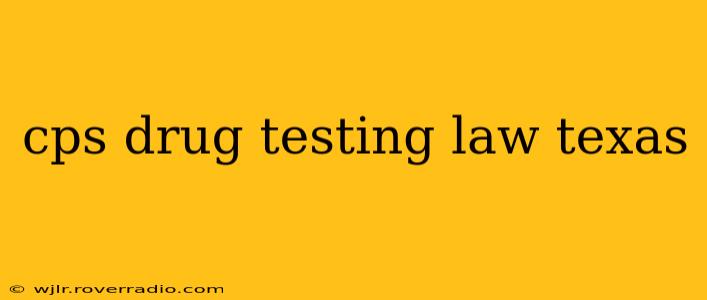Texas law allows the Department of Family and Protective Services (DFPS), also known as Child Protective Services (CPS), to conduct drug testing in certain child abuse or neglect investigations. This isn't a blanket policy applied to every case, but rather a tool used when there's reasonable suspicion of substance abuse impacting a child's safety. This guide will clarify the legal aspects surrounding CPS drug testing in Texas.
What are the Grounds for CPS Drug Testing in Texas?
CPS isn't authorized to randomly drug test parents. There must be a reasonable suspicion, based on specific observations and evidence, that a parent's drug use is negatively affecting the child's well-being. This reasonable suspicion might stem from various factors, including:
- Reports of drug use: Witness accounts, police reports, or admissions of drug use.
- Observable signs of intoxication: Slurred speech, impaired coordination, or other indicators of recent drug use.
- Evidence of drug paraphernalia: The presence of needles, pipes, or other drug-related items in the home.
- Child's statements: A child's report of parental drug use, though this alone may not be sufficient.
- History of drug abuse: Previous reports or evidence of substance abuse by the parent.
What Happens During a CPS Drug Test?
If CPS has reasonable suspicion, they may request a drug test. This typically involves a urine sample, though other methods might be used depending on the circumstances. Refusal to submit to a drug test can be considered evidence of substance abuse and could negatively impact the case. The results are then used as evidence in the investigation.
Can CPS Force Me to Take a Drug Test?
While CPS can't force you to take a drug test in the same way law enforcement can, refusing to cooperate can have serious consequences. Your refusal might be interpreted as an admission of guilt, strengthening the case against you. Cooperation demonstrates a willingness to address concerns about your child's safety. However, it's crucial to consult with an attorney if CPS requests a drug test.
What are My Rights During a CPS Investigation?
You have several important rights during a CPS investigation, including:
- The right to remain silent: You are not obligated to answer questions that could incriminate you.
- The right to an attorney: You have the right to legal representation throughout the process.
- The right to due process: CPS must follow established procedures and provide you with fair treatment.
What if I Test Positive for Drugs?
A positive drug test doesn't automatically mean your children will be removed from your care. CPS will consider various factors, including the severity of the drug use, the presence of a safety plan, and your willingness to participate in treatment programs. The goal is to ensure the child's safety and well-being.
Can CPS Drug Test My Child?
Generally, CPS doesn't drug test children unless there's a specific medical reason or a strong suspicion of drug exposure. If such a test is considered, parental consent is usually required, except in exceptional circumstances.
How Can I Protect Myself and My Family?
Proactive steps can help protect your family from potential CPS involvement. These include:
- Maintaining a safe and clean home environment.
- Seeking help for substance abuse issues if needed.
- Cooperating with CPS investigations.
- Consulting with an attorney if you face allegations of child abuse or neglect.
Remember, this information is for educational purposes only and does not constitute legal advice. If you are facing a CPS investigation, it's crucial to seek the advice of a qualified Texas family law attorney immediately. They can help you understand your rights and navigate the complex legal processes involved.
